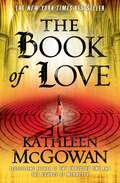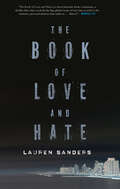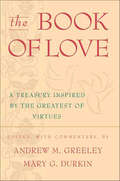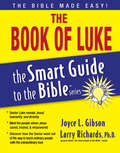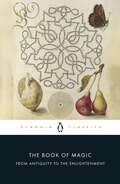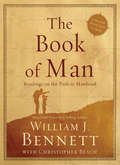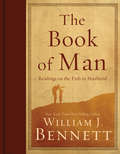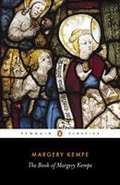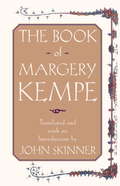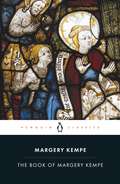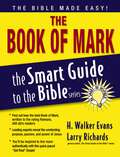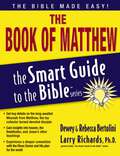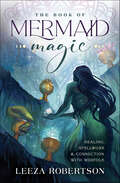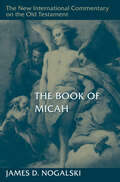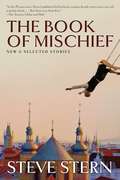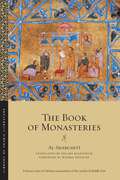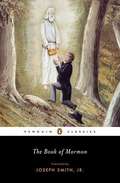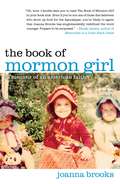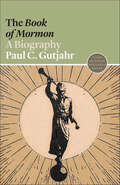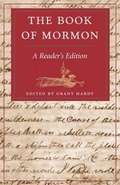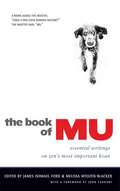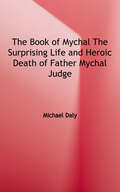- Table View
- List View
The Book of Love
by Kathleen McGowanMaureen Paschal thought she might rest and work on her book after discovering the gospel written by Mary Magdalene that revealed Jesus and Mary Magdalene were married. The truth of their story rocked the world and made Maureen a target of those who did not like her discovery and a heroine to those who did. Then Maureen receives a strange package containing what looks like an ancient letter written in Latin and signed with a symbol. She discovers that its author is an extraordinary woman whom history has overlooked -- or covered up -- Countess Matilda of Tuscany, and in the letter Matilda demands the return of her "most precious books and documents." Maureen soon finds herself in a race across Italy and France, where hidden dangers await her and her lover, Bérenger, as they begin to realize that they are on the trail of another explosive discovery: the Book of Love, the Gospel written in Jesus' own hand. As Maureen learns more about Matilda, an eleventhcentury warrior countess who was secretly married to a pope, she begins to see the eerie connections between herself and Matilda, connections she must trace to their source if she is to stop the wrong people from finding the Book of Love and hiding it forever. Weaving together Matilda's little-known true story and Maureen's thrilling search, The Book of Love follows two amazing heroines as their stories intertwine through time. Maureen is immersed in the mysteries of the labyrinth, the beautiful poetry of the Song of Songs, the world's greatest art and architecture, and Matilda's amazing legacy...until a potentially fatal encounter reveals the Book of Love to Maureen -- and to the reader.
The Book of Love and Hate
by Lauren Sanders"Sanders, whose first novel Kamikaze Lust, won a 2000 Lambda Literary Award, offers an international espionage thriller in which a failed Olympic speed skater falls for her father's lover, a former Israeli army pilot turned corporate spy."--Publishers Weekly"This is a book of murky morality and uncertain resolutions. Which is to say, a thriller of literary pedigree, unbound by convention...If you're seeking a cathartic resolution in the final pages, you might be disappointed--but you shouldn't be surprised. Not when you're talking about Israel and corrupt fortunes, and madness, obsession, and abuse. These are the themes of timeless fiction; we can work through them and seek something resembling sanity. Just don't expect to find a safe, comforting space in the pages of Lauren Sanders's discomforting and terrific book."--Village Voice"[A] thrilling tale of espionage, family ties, sex, love, and betrayal. If you're looking for an exciting and juicy read, look no further."--The Advocate, Included in "17 New Books About LGBT Families""Set in contemporary Israel, The Book of Love and Hate by Lambda Literary Award-winning author Lauren Sanders follows failed Olympic speed skater Jennifer on a quest to find her missing billionaire father as she encounters 'fake Orthodox Jews, queer Palestinians on the run' and a host of others."---Bay Area Reporter“The Book of Love and Hate, a new novel from Lambda Literary Award winner Lauren Sanders, tells of protagonist Jennifer Baron encounters with queer Palestinians in Israel while searching for her missing father."--Washington Blade"A literary spy thriller and love story that shifts between New York and Israel, The Book of Love and Hate by Lauren Sanders is told from the perspective of a failed Olympic skater, trying to stay sober. Traveling to Israel in search of her disappeared father, she encounters a Mossad agent gone bad, fake Orthodox Jews, gay Palestinians on the run and others wandering the Holy Land."--The New York Jewish Week, included in Fall Books Preview"Sanders knows how to craft a story. The storyline is riveting, and the personal development of the characters kept me engaged on a deeper level than even her thrilling plot could. Her prose is beautiful and brings you to an ending that is sure to have you reeling."--Windy City Times"Brilliant...Like Jeanette Winterson, with dazzling language and character anathema to sensibilities, Sanders spotlights human transgression...The Book of Love and Hate contains lessons of patriarchal pitfalls, written with a brilliance sure to challenge social constructs via opposition, shining a light on non-binary thinking and lesbian love."--Sinister WisdomJennifer Baron is a failed Olympic speed skater now running her family's foundation and trying to stay sober, when her billionaire father disappears. She travels to Israel in search of him, becoming recklessly entangled in his illegal dealings and with his enigmatic lover, Gila, a former Mossad agent gone bad. Along the way, she is drawn into the shadow worlds of the Promised Land, where career-jockeying government agents, fake Orthodox Jews, queer Palestinians on the run, and other displaced wanderers scramble to find home amid the endless cycles of war, occupation, and heartbreak.The Book of Love and Hate is an unraveling of white-collar crime and its motivations. It's a testament to the magnificent oblivion of love and a shattering of inherited trauma, both personal and historical.
The Book of Love: A Treasury Inspired by the Greatest of Virtues
by Mary G. DurkinLove. Of all the virtues that have been passed on to us through the ages, from the great poets to the saints and scholars, throughout history and literature, love is the one virtue that we as a society cannot live without.The ability to love well and to love wisely is the most important trait that parents can pass on to their children. As children grow, the longing to share this love as well as receive it will remain strong throughout their lives. Bestselling author Andrew M. Greeley and his sister, Dr. Mary G. Durkin have complied a beautiful and inspiring anthology that will help us comprehend this the most important of virtues and also help us express and understand what it means to love, and how to love wisely. The Book of Love is a perfect gift for a parent to give to a child, for relatives or friends to share, or for those who are coming to know this virtue in all its glory. People of all nations, creeds, colors, and denominations will appreciate this treasury of essays, poems, stories, and songs reflecting the one human need that has remained constant: Love.It has been written about in the Bible, and it was passed down orally in myth and legend. It was discussed by the Chinese philosopher Confucius and in the Koran, and it inspired great works of literature and the pages of popular fiction. The Book of Love is a testament to the enduring nature of our own good, a good expressed through the human bond. In the tradition of William J. Bennett's The Book of Virtue, The Book of Love is a collection to be treasured, and shared, but most of all, it will guide us to express and to pass on the greatest of life's virtues: Love.At the Publisher's request, this title is being sold without Digital Rights Management Software (DRM) applied.
The Book of Luke
by Dr Joyce GibsonDiscover What a Friend You Have in JesusHe's the Savior of the world, the Friend who stands by the sick and brokenhearted. He was perfectly human-and perfectly holy. He heals. He empowers. All this and more is uniquely captured in Luke's New Testament Gospel. The Smart Guide to the Bible: The Book of Luke reveals the good doctor's detailed research into Jesus' life and ministry (resulting in the longest of the four Gospels and the only one to have certain parables, like the Prodigal Son). You will be encouraged and emboldened, just as the early Christians were!Be Smart About:,Jesus' Humanity & DivinityJesus' Birth & DeathHealing & MiraclesTemptationJesus, Friend of SinnersRelating to PeopleJesus's MinistryAnd More! Smart Guides Are for Everyone!The Bible is loaded with valuable insights for every area of your life. The Smart Guides to the Bible let you easily uncover them all-even the passages you once thought were hard to understand.Whether you're new to the Bible, a long-time student of Scripture or somewhere in between, you'll appreciate the many ways the relevant helps on each page lead you to get the most out of God's Word.
The Book of Magic: From Antiquity to the Enlightenment
by Brian Copenhaver'. . . as when iron is drawn to a magnet, camphor is sucked into hot air, crystal lights up in the Sun, sulfur and a volatile liquid are kindled by flame, an empty eggshell filled with dew is raised towards the Sun . . .'An odd feature of the Bible is that it is full of stories featuring forms of magic and possession - from Joseph battling with Pharaoh's wizards to the supernatural actions of Jesus and his disciples. As, over the following centuries, the Christian church attempted to stamp out 'deviant' practices, there was a persistent interest in magic that drew strength from this Biblical validation. A strange blend of mumbo-jumbo, fraud and deeply serious study, magic was central to the European Renaissance, fascinating many of its greatest figures. Brian Copenhaver's wonderful anthology will be welcomed by everyone from those with the most casual interest in the magical tradition to anyone drawn to the Renaissance and the tangled, arcane roots of the scientific tradition.
The Book of Man
by Dr William J. BennettWHAT IT MEANS TO BE A MAN Raising up men has never been easy, but today is seems particularly tough. The young and old need heroes to embody the eternal qualities of manhood: honor, duty, valor, and integrity. InThe Book of Man, William J. Bennett points the way, offering a positive, encouraging, uplifting, realizable idea of manhood, redolent of history and human nature, and practical for contemporary life. Using profiles, stories, letters, poems, essays, historical vignettes, and myths to bring his subject to life, The Book of Man defines what a man should be, how he should live, and to what he should aspire in several key areas of life: war, work, leisure, and more. "Whether we take up the sword, the plow, the ball, the gavel, our children, or our Bibles," says Bennett, "we must always do it like the men we are called to be."The Book of Man shows how.
The Book of Man
by William J. BennettWHAT IT MEANS TO BE A MANRaising up men has never been easy, but today is seems particularly tough. The young and old need heroes to embody the eternal qualities of manhood: honor, duty, valor, and integrity. In The Book of Man, William J. Bennett points the way, offering a positive, encouraging, uplifting, realizable idea of manhood, redolent of history and human nature, and practical for contemporary life.Using profiles, stories, letters, poems, essays, historical vignettes, and myths to bring his subject to life, The Book of Man defines what a man should be, how he should live, and to what he should aspire in several key areas of life: war, work, leisure, and more. "Whether we take up the sword, the plow, the ball, the gavel, our children, or our Bibles," says Bennett, "we must always do it like the men we are called to be." The Book of Man shows how.
The Book of Margery Kempe
by B. A. WindeattHere Kemp recounts in vivid, unembarrassed detail the madness that followed the birth of the first of her fourteen children, the failure of her brewery business, her dramatic call to the spiritual life, her visions and uncontrollable tears, the struggle to convert her husband to a vow of chastity and her pilgrimages to Europe and the Holy Land.
The Book of Margery Kempe
by John SkinnerThough a familiar name, little was known about the English mystic Margery Kempe (c. 1373-c. 1440) for hundreds of years except that she had an association with the great Julian of Norwich. This all changed in 1934 with the discovery of The Book of Margery Kempe in a library where it had lain hidden for four hundred years. Finding Margery's own story was important not just because of the light it shed on her life, but it also turned out to be the first known autobiography in the English language. Even more intriguing to the experts of the day, this unique document was written by a woman. But if anyone had expected to find her anything like her cloistered contemporary, Julian, they were in for something of a surprise. Far from being a typical holy woman, Margery Kempe was married and mother of fourteen children. Moreover, she had been a woman of substance, even running a large brewery for a time. After turning to religion, she traveled thousands of miles around the known world on pilgrimages to distant lands. Beyond the circumstances of her life, what's most compelling about the text is the inner Margery that emerges. Her account of spiritual awakening, far from being a blissful episode is instead full of conflict and recrimination. What good was this new way of life if it caused her such trouble? Was this really the only way to lead a holy life? Margery remained unsure of the answers. But her patience in her struggle is a wonder to behold, and an example for us today.
The Book of Margery Kempe
by Margery KempeA remarkable medieval woman's life and the earliest surviving autobiography in English, now updated with new materialThe story of the eventful life of Margery Kempe - medieval wife, mother, businesswoman, pilgrim and visionary - is the earliest surviving autobiography in English. Here Kempe recounts in vivid, unembarrassed detail the madness that followed the birth of the first of her fourteen children, the failure of her brewery business, her dramatic call to the spiritual life, her vow of chastity and pilgrimages to Europe and the Holy Land. Margery Kempe could not read or write, and dictated her story late in life: a remarkable portrait of a woman of unforgettable character and courage. This fully updated edition of Barry Windeatt's modern English translation includes a new introduction, notes and scholarly apparatus. Translated with a new introduction by Barry Windeatt
The Book of Mark (The Smart Guide to the Bible Series)
by Walker EvansMark told it like it was so you could see Jesus as He is. Each Gospel, or biography of Jesus, is unique. The bold Book of Mark was written to the ruling Romans. This fast-paced narrative is the shortest Gospel. Likely penned first, Mark takes you into the action and gets to the point. Now, with the verse-by-verse insights of The Smart Guide to the BibleTM: The Book of Mark you'll experience the unparalleled power of Jesus and be inspired to live with greater authenticity and purpose.
The Book of Matthew (The Smart Guide to the Bible Series)
by Dewey BertoliniThis First New Testament Book Gives You an Up-Close Look at the Savior of the WorldWhat did the arrival of the promised Messiah mean for the Jews of Matthew's day? What does it mean for you today? The Smart Guide to the Bible: The Book of Matthew gives you valuable insights into Christ's life and teachings, death, and resurrection so you can more fully experience the purpose and power of King Jesus at work in your life.Be Smart About Christ's Birth & Death Heaven The Beatitudes Prophecy O. T. Salvation Legalism The Future And More!
The Book of Mermaid Magic: Healing, Spellwork & Connection with Merfolk
by Leeza RobertsonDive into Magical Waters and Find Your Mermaid SelfTransform your landlocked world into a living prayer with this book's numerous rituals, spells, devotions, and healing exercises. Leeza Robertson guides you into the realm of mystical water creatures, where you'll connect to your mermaid self by exploring eight archetypes and how each one can enhance your practice. From the Sea Witch to the Nymph, these archetypes help you balance your chakras, harness the energy of the moon phases, call on the healing power of water, and invite more abundance and happiness into your life. Each chapter goes beyond merfolk legends, providing aura-boosting techniques, journaling prompts, cartomancy exercises, sacred space practices, and more. Featuring illustrations by award-winning artist Julie Dillon, this book shows you how to find your source of power and share your inner mermaid with the world.
The Book of Micah (The\new International Commentary On The Old Testament Ser.)
by James D. NogalskiWhat is the balance between judgment and hope? Micah spoke powerfully to the people of Judah millennia ago. His prophecy has the same power to change the minds and hearts of Christians today. As a volume of the New International Commentary on the Old Testament, James D. Nogalski&’s fresh commentary on Micah is academically serious and pastorally relevant. Based on Nogalski&’s original translation of the Hebrew text, this commentary takes seriously the historical and theological contexts of the book of Micah. The thorough introduction considers the book&’s literary form, its composition, and its function in the canon, especially within the Book of the Twelve. Ample notes point readers to the most relevant, up-to-date critical scholarship. Nogalski explicates Micah&’s major themes, including fidelity to Yahweh, abuses of power, and the intriguing juxtaposition of judgment and hope for God&’s people. Combining scholarly rigor with an evangelical point of view, The Book of Micah serves as the perfect companion for scholars, students, and pastors seeking to understand this essential prophet.
The Book of Mischief: New and Selected Stories
by Steve Stern"In the 25 years since [Stern] published his first book, younger Jewish writers have run with a similar shtick . . . But Stern was there first." —The Toronto Globe and MailThe Book of Mischief triumphantly showcases twenty-five years of outstanding work by one of our true masters of the short story. Steve Stern's stories take us from the unlikely old Jewish quarter of the Pinch in Memphis to a turn-of-thecentury immigrant community in New York; from the market towns of Eastern Europe to a down-at-the-heels Catskills resort. Along the way we meet a motley assortment of characters: Mendy Dreyfus, whose bungee jump goes uncannily awry; Elijah the prophet turned voyeur; and the misfit Zelik Rifkin, who discovers the tree of dreams. Perhaps it's no surprise that Kafka's cockroach also makes an appearance in these pages, animated as they are by instances of bewildering transformation. The earthbound take flight, the meek turn incendiary, the powerless find unwonted fame. Weaving his particular brand of mischief from the wondrous and the macabre, Stern transforms us all through the power of his brilliant imagination.
The Book of Monasteries (Library of Arabic Literature)
by al-ShābushtīA literary tour of Christian monasteries of the medieval Middle EastThe Book of Monasteries takes readers on a tour of the monasteries of the Middle East by presenting the rich variety of poetry and prose associated with each monastery. Starting with Baghdad, readers are taken up the Tigris into the mountains of south-eastern Anatolia before moving to Palestine and Syria, along the Euphrates down to the old Christian center of Ḥīrah and onward to Egypt. For the literary anthologist al-Shābushtī, who was Muslim, monasteries were important sites of interactions with Christian communities that made up about half the population of the Abbasid Empire at the time.Each section in this anthology covers a specific monastery, beginning with a discussion of its location and the reason for its name. Al-Shābushtī presents poems, anecdotes, and historical reports related to each. He selects heroic and spectacular incidents, illustrations of caliphal extravagance, and events that gave rise to memorable verse. Important political personalities and events that were indirectly linked with monasteries also appear in the collection, as do scenes of festive court life and gruesome murders. Al-Shābushtī uses these accounts not to teach history but to offer a meditation on the splendor of Abbasid culture as well as moral and philosophical lessons: the ephemerality of power; the virtues of generosity and tolerance; the effectiveness of eloquence in prose and poetry; the fleeting nature of pleasure and beauty. Translated into English for the first time, The Book of Monasteries offers an entertaining panorama of religious, political, and literary life during the Abbasid era.An English-only edition.
The Book of Mormon
by Laurie F. Maffly-Kipp Joseph B. SmithThe spiritual text that forms the basis of Mormonism?in the last edition edited by its founder, Joseph Smith, Jr.THE BOOK OF MORMON is one of the most influential? as well as controversial?religious documents in American history, and is regarded as sacred scripture by followers around the world, including members of the Church of Jesus Christ of Latter-Day Saints, the fourth-largest religious body in the United States. According to Mormon belief, The Book of Mormon was inscribed on golden plates by ancient prophets. I t contains stories of ancient peoples migrating from the Near East to the Americas, and also explains that Jesus Christ appeared to the New World after his resurrection. The golden plates were discovered in upstate New York and translated by Joseph Smith, Jr., under the guidance of an angel, Moroni. From this divine revelation, Smith founded the Mormon sect, which is now comprised of more than 12.5 million members worldwide.
The Book of Mormon Girl
by Joanna BrooksFrom her days of feeling like "a root beer among the Cokes"--Coca-Cola being a forbidden fruit for Mormon girls like her--Joanna Brooks always understood that being a member of the Church of Jesus Christ of Latter-day Saints set her apart from others. But, in her eyes, that made her special; the devout LDS home she grew up in was filled with love, spirituality, and an emphasis on service. With Marie Osmond as her celebrity role model and plenty of Sunday School teachers to fill in the rest of the details, Joanna felt warmly embraced by the community that was such an integral part of her family. But as she grew older, Joanna began to wrestle with some tenets of her religion, including the Church's stance on women's rights and homosexuality. In 1993, when the Church excommunicated a group of feminists for speaking out about an LDS controversy, Joanna found herself searching for a way to live by the leadings of her heart and the faith she loved. The Book of Mormon Girl is a story about leaving behind the innocence of childhood belief and embracing the complications and heartbreaks that come to every adult life of faith. Joanna's journey through her faith explores a side of the religion that is rarely put on display: its humanity, its tenderness, its humor, its internal struggles. In Joanna's hands, the everyday experience of being a Mormon--without polygamy, without fundamentalism--unfolds in fascinating detail. With its revelations about a faith so often misunderstood and characterized by secrecy, The Book of Mormon Girl is a welcome advocate and necessary guide.
The Book of Mormon Girl: A Memoir of an American Faith
by Joanna BrooksFrom her days of feeling like "a root beer among the Cokes"--Coca-Cola being a forbidden fruit for Mormon girls like her--Joanna Brooks always understood that being a member of the Church of Jesus Christ of Latter-day Saints set her apart from others. But, in her eyes, that made her special; the devout LDS home she grew up in was filled with love, spirituality, and an emphasis on service. With Marie Osmond as her celebrity role model and plenty of Sunday School teachers to fill in the rest of the details, Joanna felt warmly embraced by the community that was such an integral part of her family. But as she grew older, Joanna began to wrestle with some tenets of her religion, including the Church's stance on women's rights and homosexuality. In 1993, when the Church excommunicated a group of feminists for speaking out about an LDS controversy, Joanna found herself searching for a way to live by the leadings of her heart and the faith she loved. The Book of Mormon Girl is a story about leaving behind the innocence of childhood belief and embracing the complications and heartbreaks that come to every adult life of faith. Joanna's journey through her faith explores a side of the religion that is rarely put on display: its humanity, its tenderness, its humor, its internal struggles. In Joanna's hands, the everyday experience of being a Mormon--without polygamy, without fundamentalism--unfolds in fascinating detail. With its revelations about a faith so often misunderstood and characterized by secrecy, The Book of Mormon Girl is a welcome advocate and necessary guide.
The Book of Mormon: A Biography (Lives of Great Religious #10)
by Paul C. GutjahrThe surprising career of Joseph Smith's famous bookLate one night in 1823 Joseph Smith, Jr., was reportedly visited in his family's farmhouse in upstate New York by an angel named Moroni. According to Smith, Moroni told him of a buried stack of gold plates that were inscribed with a history of the Americas' ancient peoples, and which would restore the pure Gospel message as Jesus had delivered it to them. Thus began the unlikely career of the Book of Mormon, the founding text of the Mormon religion, and perhaps the most important sacred text ever to originate in the United States. Here Paul Gutjahr traces the life of this book as it has formed and fractured different strains of Mormonism and transformed religious expression around the world.Gutjahr looks at how the Book of Mormon emerged from the burned-over district of upstate New York, where revivalist preachers, missionaries, and spiritual entrepreneurs of every stripe vied for the loyalty of settlers desperate to scratch a living from the land. He examines how a book that has long been the subject of ridicule—Mark Twain called it "chloroform in print"—has more than 150 million copies in print in more than a hundred languages worldwide. Gutjahr shows how Smith's influential book launched one of the fastest growing new religions on the planet, and has featured in everything from comic books and action figures to feature-length films and an award-winning Broadway musical.
The Book of Mormon: A Reader's Edition
by Grant HardyRegarded as sacred scripture by millions, the Book of Mormon -- first published in 1830 -- is one of the most significant documents in American religious history. This new reader-friendly version reformats the complete, unchanged 1920 text in the manner of modern translations of the Bible, with paragraphs, quotations marks, poetic forms, topical headings, multichapter headings, indention of quoted documents, italicized reworkings of biblical prophecies, and minimized verse numbers. It also features a hypothetical map based on internal references, an essay on Book of Mormon poetry, a full glossary of names, genealogical charts, a basic bibliography of Mormon and non-Mormon scholarship, a chronology of the translation, eyewitness accounts of the gold plates, and information regarding the lost 116 pages and significant changes in the text. The Book of Mormon claims to be the product of three historical interactions: the writings of the original ancient American authors, the editing of the fourth-century prophet Mormon, and the translation of Joseph Smith. The editorial aids and footnotes in this edition integrate all three perspectives and provide readers with a clear guide through this complicated text. New readers will find the story accessible and intelligible; Mormons will gain fresh insights from familiar verses seen in a broader narrative context. This is the first time the Book of Mormon has been published with quotation marks, select variant readings, and the testimonies of women involved in the translation process. It is also the first return to a paragraphed format since versification was added in 1879.
The Book of Mormon: Another Testament of Jesus Christ
by Joseph SmithThe Book of Mormon is a volume of holy scripture comparable to the Bible. It is a record of God's dealings with the ancient inhabitants of the Americas and contains, as does the Bible, the fulness of the everlasting gospel. The book was written by many ancient prophets by the spirit of prophecy and revelation. Their words, written on gold plates, were quoted and abridged by a prophet-historian named Mormon.
The Book of Mu
by John Tarrant James Ishmael Ford Melissa Myozen BlackerThe word "mu" is one ancient Zen teacher's response to the earnest question of whether even a dog has "buddha nature". Discovering for ourselves the meaning of the master's response is the urgent work of each of us who yearns to be free and at peace. "Practicing Mu" is synonymous with practicing Zen, "sitting with Mu" is an apt description for all Zen meditation, and it is said that all the thousands and thousands of koans in the Zen tradition are just further elaborations of Mu. This watershed volume brings together over forty teachers, ancient and modern masters from across centuries and schools, to illuminate and clarify the essential matter: the question of how to be most truly ourselves. Includes writings from: Dogen, Hakuin, Dahui, Thich Thien-An Zenkei Shibayama, Seung Sahn, Taizan Maezumi, Sheng Yen Philip Kapleau, Robert Aitken, Jan Chozen Bays, Shodo Harada Grace Schireson, John Daido Loori, John Tarrant Barry Magid, Joan Sutherland, and many more!
The Book of Mychal: The Surprising Life and Heroic Death of Father Mychal Judge
by Michael DalyThe inspiring story of New York Fire Department Chaplain Father Mychal Judge. <p> His death certificate bears the number one. As chaplain to the Fire Department of New York, Father Mychal Judge was officially the first to go. A loving priest with a gift for the gab-gregarious yet humble, a healer with the ability to wipe away a widow's tears and put a smile on a fireman's face. And on September 11th Father Mike rushed to the fires at the World Trade Center as quickly as those who fought them, losing his own life while tirelessly ministering to New York's bravest. <p><p>"'Father Mike'" recounts the colorful, astonishing and at times troubled life of a priest who saw the potential for good in everybody—in the homeless person he slipped a dollar to on the street; the alcoholic he sought to coax to an AA meeting; the early victims of AIDS he embraced and comforted; the troubled young men he visited in jail; and the thousands of firefighters he blessed as they rushed to their rigs answering the call. Here was a priest who rejoiced in the life around him and understood that even the most terrible times present us with wonders-that good always arises from the bad in the most unexpected ways. Or as Father Mike would say, "'My God is a God of surprises.'" <p><p>In this touching book, author Michael Daly retraces the footsteps of Father Mike as his vocation takes us inside the firehouse, inside his friary and his Church, and inside the chaos that often befalls New York. This is the tale of a larger than life priest who, in death, became a symbol of how much we truly lost that Tuesday in September. "'Father Mike'" is the inspirational story of a hero priest who blessed so many lives and will long be remembered by it.
